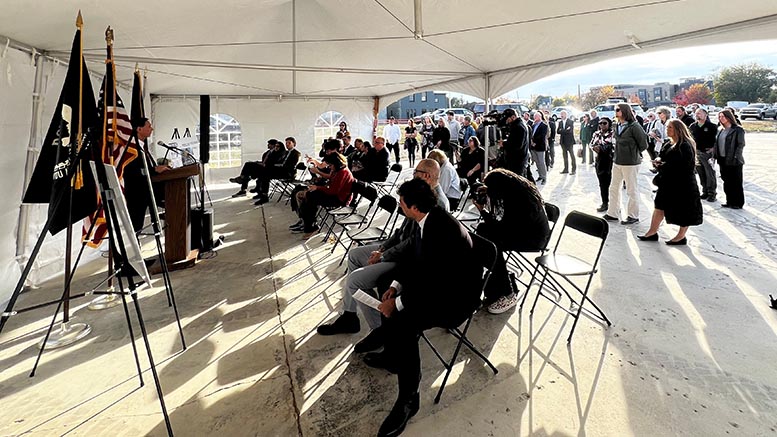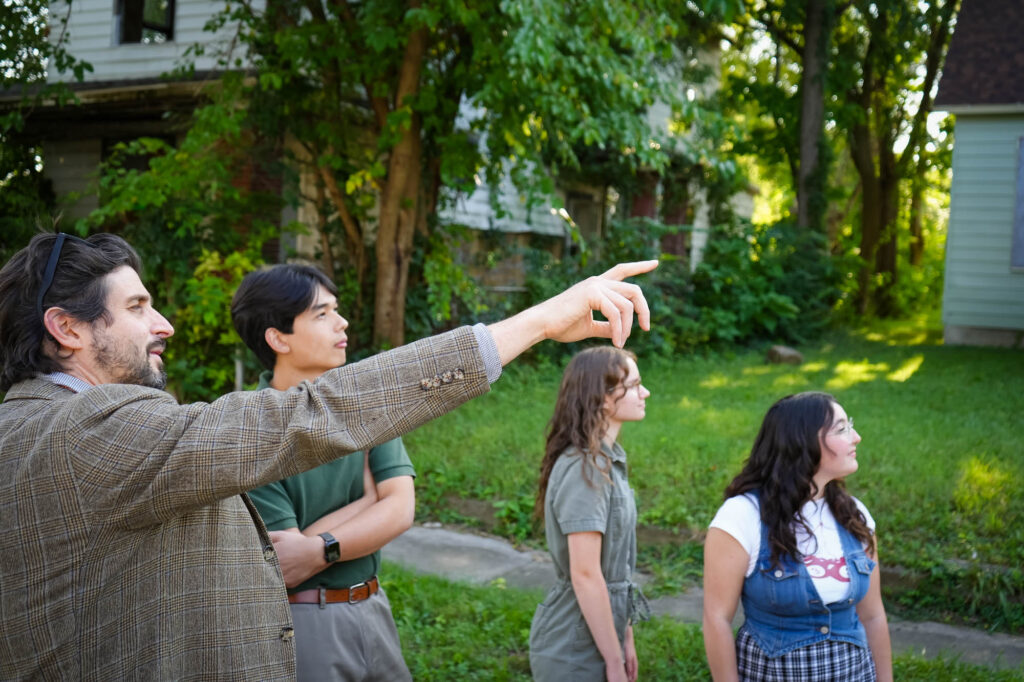A major economic development initiative announced this week by Indiana Gov. Mike Braun and Muncie Mayor Dan Ridenour is rooted in years of collaborative research and planning led by Ball State University’s Estopinal College of Architecture and Planning (ECAP).
Through the state’s READI 2.0 program, Muncie has been awarded $6.75 million to advance new housing developments downtown and within the city’s historic Old West End neighborhood. The funding—part of Indiana’s $500 million statewide investment to enhance quality of place and economic opportunity—will support construction of a four-story, 54-unit apartment building across from City Hall and 34 additional homes in the Old West End, including 30 new single-family houses and four rehabilitated historic properties.
These developments—collectively known as the Muncie Central City Housing Project—will bring nearly 100 new residential units, new retail and commercial space, and a distinctive public greenspace and gateway feature connecting downtown and the Old West End.
Ball State’s Department of Urban Planning, the Muncie Land Bank, and nonprofit developer Intend Indiana jointly initiated the Old West End Comprehensive Community Development Project, which became a cornerstone of Muncie’s READI proposal. Students in Ball State’s neighborhood-planning studios gathered data, engaged residents, and developed block-level strategies that guided the proposal’s design. Those Immersive Learning studio courses were co-taught by Nate Howard, executive director of the Muncie Land Bank, and Jeb Reece, a Ball State alumnus and director of strategic initiatives at Intend Indiana, in 2023; and by Mr. Howard and Brad King, another Ball State alumnus who serves as chair of the Muncie Land Bank Board of Directors, president of the Old West End Neighborhood Association, and ECAP adjunct faculty member, in 2024.
Dr. Pam Harwood, professor of architecture, and Dr. Tom Collins, associate professor of architecture, also contributed research and design concepts that shaped the final development plans.
The project also reflects the collaborative leadership of Mayor Ridenour and the Board of Commissioners of Delaware County, whose support positioned the community for this investment.
“Our faculty and students partnered with neighbors to design practical, people-focused solutions that reconnect campus and downtown,” said Dr. Anand R. Marri, provost and executive vice president for academic affairs at Ball State. “This investment turns their work into new homes, renewed blocks, and a stronger quality of place for Muncie.”

Muncie Mayor Dan Ridenour speaks at an Oct. 28 press conference announcing the City of Muncie securing $6.75 million in READI 2.0 state funding (photo provided/City of Muncie).
The resulting plan—developed with the Old West End Neighborhood Association, ecoREHAB, PathStone Corporation, and the Old West End Neighborhood Economic Redevelopment Corporation—focuses on affordable, workforce, and market-rate housing, home rehabilitation, green-space creation, and small-business opportunities designed to reconnect downtown and surrounding neighborhoods.
“The Old West End plan exemplifies how our students apply classroom knowledge to real-world challenges,” said Dr. John West, department chair of Ball State’s Department of Urban Planning, where he also serves as an associate professor. “Working alongside the Land Bank and neighborhood partners, students helped craft a development model that promotes economic growth for Muncie.”
Located between Ball State University and downtown, the Old West End was identified in the city-county Together DM and Muncie Action Plan as a priority area for reinvestment due to its architectural significance, high vacancy rate, and potential to serve as a gateway between campus and downtown. Ball State’s studio research and community engagement informed the formation of the Old West Development Alliance, which has secured dozens of properties, established shared design standards, and positioned the neighborhood for renewed investment.
Construction activity on both the downtown apartments and the first phase of the Old West End housing development is expected to begin in 2026.

